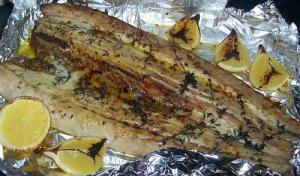Time for snoek @ West Coast!
On the West Coast, fishermen of all ilk wait with bated breath for winter, anticipating the arrival of the beloved Cape snoek. Whilst snoek are resident off the coast all year round, they are here in particularly good numbers in the winter months, following the massive sardine shoals that swim down from Namibia.

PHOTO FROM 
Whether for commercial, subsistence or recreational reasons, snoek reserves a special place in the fisherman’s heart. Amongst the whitewashed buildings in the small fishing villages all along the coast, the subsistence fisherman string the freshly caught snoek up to air dry in the salty sea breeze and eat it as is or add it to stews, casseroles and soups. Smoorsnoek, snoek bredie and snoek pâtés are all trademark Cape Coloured favourites. Originally called zeesnoek by the Dutch settlers who arrived in the Cape in 1652, snoek was once snubbed as a poor man’s food, but its oily flesh and distinctive taste now break all the boundaries of wealth and status. All over South Africa, and especially in the Western Cape, snoek is a regular presence at afternoon braais, even in the manicured gardens of the super-rich. It’s probably at its best when smoked, or wrapped in tinfoil with garlic, butter and tamatiesmoor, or baked in a pie, or mashed into a fish cake (ice cream seems to be about the only thing it won’t work with, although the locals are partial to spreading the fish with a dollop of apricot jam).
Buying the fish as fresh as it comes, the famed seaside restaurants on the West Coast have perfected the art of cooking snoek. The Strandloper in Langebaan serves a mouth-watering seafood lunch encompassing around 10 courses, with braaied snoek being a particular highlight. In the delightful village of Paternoster, chef Suzi Holtzhausen cooks up a mean snoek pie at Gaaitjie. Meanwhile, Strandkombuis in Yzerfontein serves up some delectable smoked snoek in a unique Bedouin tent beach setting.
If brave enough to take on their razor sharp teeth and brutish fighting abilities, then recreational anglers can catch the fish themselves off the West Coast. The locals are usually more than happy to clean your fish for a small fee.
*This article was written by a TWNA journalist, Dale Hes for The Traveller magazine.